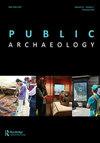Editorial
IF 0.9
4区 历史学
0 ARCHAEOLOGY
引用次数: 0
Abstract
It is well over a year since the first lockdowns on campus and the need to rethink our teaching and learning. Analysing our performance in this regard will take time, but many of the ideas coming through can add extra weight to our efforts to meet the needs of our students under the present constraints. The obvious approach is to move to online teaching, but this is increasingly being met by student resistance – usually in the form of complaints that they are not getting their money’s worth. Some of the articles in this issue look at the application of technology, in particular contexts, but the initial clutch of articles is primarily concerned with learning in groups. Some of the articles deal with the facilitating technology but others predate the current concerns and reflect the wider approach to teaching and learning. This is a very international selection of papers, which hold the prospect of translating ideas from other parts of the world. The first article by Christopher Lange, Jamie Costley and Mik Fanguy is based on work in South Korea and looks at cognitive load. One of the key results was that better participation in group work led to better exam performance, at least in postgraduate students in STEM subjects. Implications also suggest the need for synchronous collaborative writing as a way of sharing ideas and knowledge to produce higher levels of individual understanding and quality writing. Following this is an article from Sara Arena and Julian Davies from the United States that, similarly, found a correlation between co-operative learning and student achievement. This study is based on first year Mechanical Engineering, but the results suggest that the benefits are not concept specific. The third paper, from Limerick in Ireland, looks at student perceptions of problembased learning. The context here is Masters-level study in Business. The suggestion is that the adoption of PBL goes beyond issues of teaching and learning to the development of professional attributes that could aid future advancement. An article from Iran by Fatemeh Keshmiri and colleagues, looks at inter-professional education, an area often identified with PBL but here using a case-study approach. The context is in professional education in the field of health: often a leader in collaborative learning and also an area where inter-professional collaboration is necessary in the workplace. Moving more towards the technology of collaboration is a paper from London-based Zeller Pimlott and Tricia Tikasingh, looking at the use of wikis. Results suggested that a wiki-based collaborative knowledge repository was valued by students above knowledge gained elsewhere online. A group of two articles examines issues around doctoral supervision. First, a paper from Magdalena Jara, from Coventry explores peer learning and case studies as elements in the professional development of supervisors, in the context of an evaluation of a programme for supervisors. Following this, West London-based Isabel Huet and Diogo Casanova look INNOVATIONS IN EDUCATION AND TEACHING INTERNATIONAL 2021, VOL. 58, NO. 4, 375–376 https://doi.org/10.1080/14703297.2021.1942362编辑
第一次校园封锁已经一年多了,我们需要重新思考我们的教学。分析我们在这方面的表现需要时间,但在目前的限制下,许多想法可能会给我们满足学生需求的努力增加额外的砝码。显而易见的方法是转向在线教学,但这越来越受到学生的抵制——通常表现为抱怨他们的钱不值。本期的一些文章着眼于技术在特定环境中的应用,但最初的几篇文章主要关注小组学习。其中一些文章涉及促进技术,但另一些文章早于当前的关注,反映了更广泛的教学方法。这是一个非常国际化的论文选集,具有翻译世界其他地区思想的前景。Christopher Lange、Jamie Costley和Mik Fanguy的第一篇文章基于在韩国的工作,着眼于认知负荷。其中一个关键结果是,更好地参与小组工作会带来更好的考试成绩,至少在STEM科目的研究生中是这样。影响还表明,需要同步合作写作,作为一种分享想法和知识的方式,以产生更高水平的个人理解和高质量的写作。以下是来自美国的Sara Arena和Julian Davies的一篇文章,他们同样发现了合作学习与学生成绩之间的相关性。这项研究基于第一年的机械工程,但研究结果表明,这些好处并不是特定于概念的。第三篇论文来自爱尔兰利默里克,研究了学生对基于问题的学习的看法。这里的背景是商学硕士级别的学习。有人建议,PBL的采用超越了教学问题,而是发展了有助于未来进步的专业属性。Fatemeh Keshmiri及其同事在伊朗发表的一篇文章着眼于跨专业教育,这是一个经常被认为是PBL的领域,但这里使用的是案例研究方法。背景是健康领域的专业教育:通常是协作学习的领导者,也是工作场所需要跨专业协作的领域。总部位于伦敦的Zeller Pimlott和Tricia Tikasingh发表了一篇关于维基使用的论文,进一步探讨了协作技术。研究结果表明,基于维基的协作知识库在学生中的价值高于在其他地方获得的在线知识。一组两篇文章探讨了有关博士生导师的问题。首先,来自考文垂的Magdalena Jara的一篇论文在评估主管课程的背景下,探讨了同伴学习和案例研究作为主管专业发展的要素。在此之后,总部位于伦敦西部的Isabel Huet和Diogo Casanova展望了《2021国际教育与教学创新》,第58卷,第4期,375-376https://doi.org/10.1080/14703297.2021.1942362
本文章由计算机程序翻译,如有差异,请以英文原文为准。
求助全文
约1分钟内获得全文
求助全文

 求助内容:
求助内容: 应助结果提醒方式:
应助结果提醒方式:


